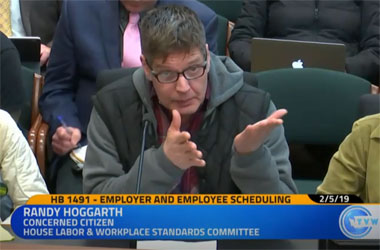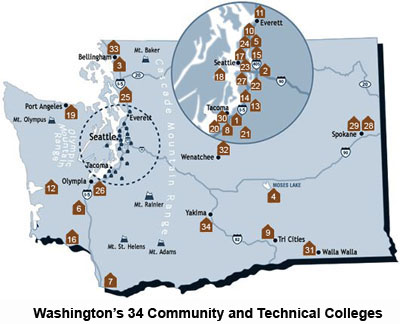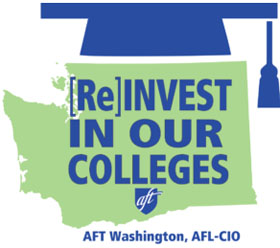STATE GOVERNMENT
Our time counts—at work and away from it (Leg. Update)
Workers support ‘secure scheduling’ bill at packed House hearing
 This is the latest edition of the weekly Legislative Update newsletter from the Washington State Labor Council, AFL-CIO. If you didn’t receive it via email, subscribe to The Stand and you’ll get the Legislative Updates and all of the WSLC’s other legislative reports.
This is the latest edition of the weekly Legislative Update newsletter from the Washington State Labor Council, AFL-CIO. If you didn’t receive it via email, subscribe to The Stand and you’ll get the Legislative Updates and all of the WSLC’s other legislative reports.
OLYMPIA (Feb. 8, 2019) — “We hold these truths to be self-evident, that all men are created equal, that they are endowed by their Creator with certain unalienable Rights, that among these are Life, Liberty and the pursuit of Happiness.” — United States Declaration of Independence, 1776
“What the woman who labors wants is the right to live, not simply exist — the right to life as the rich woman has the right to life, and the sun and music and art. You have nothing that the humblest worker has not a right to have also. The worker must have bread, but she must have roses, too.” — Rose Schneiderman of the New York Women’s Trade Union League, 1912
We have lives away from work. We want to spend time with — and take care of — our families. We want to earn a fair wage, but we want roses, too. We want to pursue happiness. That is our right.
But that right is denied when businesses force employees to be on call, report to work with little or no notice, or work the dreaded “clopen” (working the closing shift one night then an opening shift the next morning). That right is also denied when employees are denied work hours they need to support themselves and their families because their boss wants to cut costs by hiring additional part-timers rather than offer more hours to existing employees.
Put simply: we should have the right to know when we’re going to work, and how many hours we’re going to be there so we can manage our lives.
That’s the principle behind HB 1491, sponsored by Rep. Nicole Macri (D-Seattle), which was heard Tuesday in the House Labor & Workforce Standards Committee. This bill is a statewide “secure scheduling” proposal that would provide workers advance notice of schedules, access to additional hours, expanded flexibility, and more balanced lives. Modeled after a standard recently approved in the City of Seattle, this bill would ensure people who work for large fast-food, coffee, restaurant and retail chains in Washington state get balanced, flexible schedules that include:
- Two weeks’ notice of shift schedules
- Access to additional hours for current employees before new jobs are posted
- Input into work schedules, and more flexibility to accommodate caregiving, schooling, and other major life needs
- No mandatory clopening shifts
 Several workers testified Tuesday about the challenges they face arranging for child care, paying their bills, and just living their lives because of unpredictable work schedules.
Several workers testified Tuesday about the challenges they face arranging for child care, paying their bills, and just living their lives because of unpredictable work schedules.
“The biggest issue I face are the hours and schedule that varies so much from week to week that my paychecks are completely unpredictable, which makes it hard to pay the rent,” said Randy Hoggarth, a Safeway employee and member of UFCW 21. “One week I work 24 hours. The next week I work 40 hours… If I had a schedule that was more predictable, I’d have a better sense of what my income would be on a regular basis.”

“I was compelled to sponsor this bill after hearing from employees in my district and across the state about the growing challenges that people have in balancing their work lives with the growing stresses of personal life — taking care of kids, taking care of aging parents, often juggling multiple jobs to put food on the table and pay the rent,” Macri said at Tuesday’s hearing. “This bill aims to have us think about work in a different way — respecting not only the value of people’s time when they are on the job, but also the value of their time when they are away from work.”
SB 5717, the companion bill sponsored by Sen. Rebecca Saldana (D-Seattle), will get a public hearing at 10 a.m. on Monday, Feb. 11 in the Senate Labor and Commerce Committee.
(Re)invest in our community and technical colleges
There has been a lot of talk lately about employers struggling to find qualified workers and the need for a trained and educated workforce. Our state has the infrastructure in place to address this issue, but it is shortchanging the state community and technical colleges (CTCs) that provides that training and education, particularly for working-class Washingtonians.
 Nearly 60 percent of post-secondary students in the state attend or graduate from CTCs, but those 34 colleges receive less than 40 percent of the state’s higher education funding. As the backbone of our workforce development system, our state’s community and technical colleges connect K-12 students with career opportunities. After decades of defunding, we must invest in our CTCs to prepare students to thrive and achieve economic security as our state’s need for skilled and knowledgeable residents increases.
Nearly 60 percent of post-secondary students in the state attend or graduate from CTCs, but those 34 colleges receive less than 40 percent of the state’s higher education funding. As the backbone of our workforce development system, our state’s community and technical colleges connect K-12 students with career opportunities. After decades of defunding, we must invest in our CTCs to prepare students to thrive and achieve economic security as our state’s need for skilled and knowledgeable residents increases.
“There’s a shortage of workers in so many fields — high-tech and nursing and things like that — and we’re the ones that can supply those,” said Jim Howe of AFT Washington, who is a faculty member at Lake Washington Institute of Technology. “But it’s a heavy lift, and we’re struggling with our funding already.”
Chronic underfunding of our CTCs threatens the ability of colleges to attract and retain the excellent faculty and staff needed. That’s why unions across the state approved a resolution last year calling on the Washington State Labor Council, AFL-CIO to “prioritize a robust investment into the CTC system as part of its Shared Prosperity Agenda in the 2019 legislative session.”
 AFT Washington is leading the charge by launching the Reinvest in Our Colleges campaign that asks for $500 million in permanent funding over the next two years. HB 1300, sponsored by Rep. Gael Tarleton (D-Seattle), sets goals for that funding: increasing compensation for faculty, establishing an office for diversity and equity, and providing better wages for faculty and staff that work with incarcerated populations. The bill also calls for funding to increase the number of counselors at the colleges.
AFT Washington is leading the charge by launching the Reinvest in Our Colleges campaign that asks for $500 million in permanent funding over the next two years. HB 1300, sponsored by Rep. Gael Tarleton (D-Seattle), sets goals for that funding: increasing compensation for faculty, establishing an office for diversity and equity, and providing better wages for faculty and staff that work with incarcerated populations. The bill also calls for funding to increase the number of counselors at the colleges.
HB 1300 has already been heard in House College & Workforce Development, and is scheduled for executive action in that committee today. The WSLC strongly urges its passage.
Senate honors 100th anniversary of Seattle General Strike
 As the 100th anniversary of the Seattle General Strike was celebrated this week, the State Senate voted to “recognize the heritage of the labor movement in our state and the workers who participated in the Seattle General Strike of 1919, and honor the contributions they made to our country and our state.”
As the 100th anniversary of the Seattle General Strike was celebrated this week, the State Senate voted to “recognize the heritage of the labor movement in our state and the workers who participated in the Seattle General Strike of 1919, and honor the contributions they made to our country and our state.”
The House had previously passed a similar resolution, HR 4606, sponsored by Rep. Mike Sells (D-Everett).
SR 8608, sponsored by Sen. Karen Keiser (D-Kent), was adopted on Wednesday. Here is TVW coverage of the discussion of the resolution, which features excellent comments by Keiser and Sens. Steve Conway (D-Tacoma), Bob Hasegawa (D-Seattle), and Doug Ericksen (R-Ferndale):
 The WSLC Legislative Update is a weekly newsletter of the Washington State Labor Council, AFL-CIO. It describes legislation of particular concern to Washington’s working families during throughout the state legislative session. Links to previous editions are available here. Additional legislative news is posted at The Stand’s State Government section.
The WSLC Legislative Update is a weekly newsletter of the Washington State Labor Council, AFL-CIO. It describes legislation of particular concern to Washington’s working families during throughout the state legislative session. Links to previous editions are available here. Additional legislative news is posted at The Stand’s State Government section.






